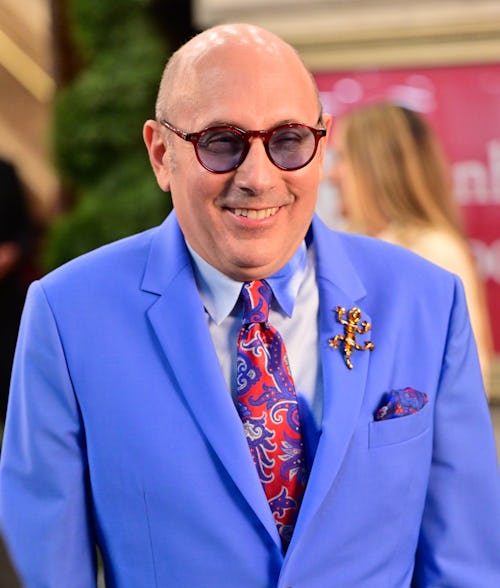
Sex and the City is a show that for better or worse raised a lot of us. It's a cross generational juggernaut that captivated Boomers just as much as it did Gen X and the elder Millennials who were allowed by their more liberal parents to watch it (me). But it didn't matter how old you were — for many fans, SATC was an introduction to a myriad of captivating big city-dwelling themes, nuances and archetypes. And no character stepped into those bespoke archetypal loafers quite like Stanford Blatch, played by Willie Garson. For some people he was the first gay character they ever got to know, and for others he was the first time they saw a reflection of themselves on a major television show.
The news of Garson's passing from cancer at just 57 years old on Tuesday has seen the beloved actor eulogized by many co-stars like Cynthia Nixon, Kim Cattrall, and Christopher Noth, but the tragic news has also surprised and saddened the masses of people who were touched by his lively and endearing television portrayal of Stanford. And as we await the HBO Max reboot And Just Like That, that Garson was working on until the end, its an essential time to consider his character's contribution to the queer television-sphere.
Stanford Blatch was not only Garson's most iconic role, but also in many ways Stanford became one of the most iconic queer representations in modern television. That's a tall order, but rings true especially when you put Stanford into the context of his time, beginning his tenure on the show in 1998 as Carrie's unapologetically effeminate and ostentatious best gay friend. Stanford was formatively queer for young people seeing a gay character on television for the first time, and a relatable reflection for those already living in the reality of being openly queer in the late 90s and early 2000s.
Like with most things SATC-related, you can't gloss over the problematic edges around the wholesome gooey center that was the inclusion of Stanford in the world of everyone's favorite solipsist, Carrie Bradshaw. In many ways he was tokenized as one of the few recurring gay characters. While you can argue that every character in the SATC universe exists merely as a foil for Carrie's experience to reflect off of, it was especially noxious to see it done to her gay BFF. I remember a jarring moment in particular in episode five of season six when Carrie invites her friends to meet her new lover, the Russian, in front of Stanford, only to tell him, "Oh sweetie, it's just the girls this time" when he gets excited to attend — heightening the tension in the show of whether Stanford was "just one of the girls" or if he was a queer prop to make Carrie seem edgier.
But as with most things problematic on SATC — especially queer representation and racial diversity — the now cringeworthy moments exist as a sort of time capsule, a cultural barometer for how far we've come. And while Stanford embodied stereotypes of gay men at the time, he also was uniquely relatable. Many gay men find themselves in the symbiotic relationship of being the gay best friend to a straight woman, and whether it was the intention or an oversight, Stanford and Carrie's relationship to one another as chosen queer nuclear family played out on screen with all of the same trappings that it often does in real life. They loved one another adjacently, while always being there to fall back on each other. Stanford was an accessory for Carrie, and Carrie a self-esteem booster for Stanford, a trope many LGBTQ+ can relate to, especially 20 years ago.
Most importantly of all though, Stanford embodied the ideal of being unwaveringly oneself. His loud, clashing outfits and sardonic wit never faltered. He was always kind and understanding; he didn't judge. He corrected Carrie on her misconceptions about psychiatric therapy and sex work. And while many of us would have liked to see Stanford given as much screen time and attention as "the girls," in some ways, his inclusion as a guest star only helped to preserve his goodness.
His few more intimate storylines like his foray as the online persona BigTool4U and his jealousy when Carrie befriends a hotter gay man showed him as sex positive and emotionally vulnerable. He may have been tokenized, but he was also protected from the narcissistic and privileged character flaws that many of the other characters are denoted by. And while Stanford Blatch may not be the "perfect" gay character, or hold up to today's standard of representation, there is no doubt that Willie Garson's pristine portrayal of him on such a monumental TV show fundamentally changed lives and the landscape of queer representation on television forever.







